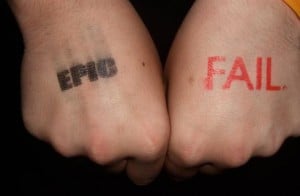So my plan today was to write a post about thoughts and conversations I’ve had recently on the subject of failure. The more I wrote and thought and wrote, however, the more I realized that this was bigger than the planned post. So, rather than abandon the post altogether, I’m posting my preliminary plan, with an appeal for your input.
It’s a little overwhelming just how many people have said something about failure. Arianna Huffington said that the “failure is not the opposite of success, it’s part of the process.” Michael Jordan said “I’ve failed over and over again… that’s why I succeed.” A simple Google search reveals countless famous failures, from Albert Einstein to Steve Jobs to Oprah Winfrey. And of course, when all else fails, we fall back on the old saw, “if at first you don’t succeed, try, try again.” We seem to understand that failure is an inevitable part of life. In fact, we collectively resent anyone who appears to be an “overnight success,” feeling like anyone who hasn’t paid their dues hasn’t really earned their fame and fortune.
 Yet, when it comes to failure in the academic context, we have a different understanding, a different regard for the student who fails a test, a course, or a grade. There seems to be a lot written about how students fail, and about how failure affects students, but I wondered how much has been written about failure from the perspective of the teacher. Are we affected when our students fail? Does student failure effect change in our teaching, in our assessment, and in our professional identity? And, from another angle, what are our assumptions about failure, based on our own experiences? Perhaps most importantly, how can we talk to our students, and to our colleagues, about failure? Can we collectively start to reimagine what failure is, what it represents, and how it (should) influence(s) teaching and learning?
Yet, when it comes to failure in the academic context, we have a different understanding, a different regard for the student who fails a test, a course, or a grade. There seems to be a lot written about how students fail, and about how failure affects students, but I wondered how much has been written about failure from the perspective of the teacher. Are we affected when our students fail? Does student failure effect change in our teaching, in our assessment, and in our professional identity? And, from another angle, what are our assumptions about failure, based on our own experiences? Perhaps most importantly, how can we talk to our students, and to our colleagues, about failure? Can we collectively start to reimagine what failure is, what it represents, and how it (should) influence(s) teaching and learning?
In this paper, I want to explore some of those questions, and look at how we rationalize failure in other aspects of life – in video games and driving schools, for instance – yet equate failure with catastrophe and psychological damage in the academic context. I’ll reflect on my own experiences, as a teacher, a student, and a parent, with failure, and (I hope) get some input from other teachers and students on failure in the STEM fields, in high-stakes standardized testing, and at various levels of education. Finally, in a wild attempt to connect this tangent to my dissertation research, I’ll reflect on failure and identity, from both student and teacher – and perhaps, institutional – perspectives.
Suggestions for resources and, in particular, personal input would be very much appreciated. If you think you’d like to share, but aren’t sure where to start, consider these questions for inspiration:
- Did you encounter failure in school? How did it feel at the time? Were you expecting it? How does it feel now, in retrospect?
- If you are a teacher, or educational administrator, what do you think the role of failure is in learning? How do you feel if a student fails? How do you react if a large number of students fail a course or test?
- If you’re a parent, how have you dealt with academic failure with your children?
- If you are neither a teacher nor a parent, what are your thoughts on failure in the academic (or any other) context? Are there fields or levels in which failure should be more or less present?
And, of course, if you have other ideas, please share!